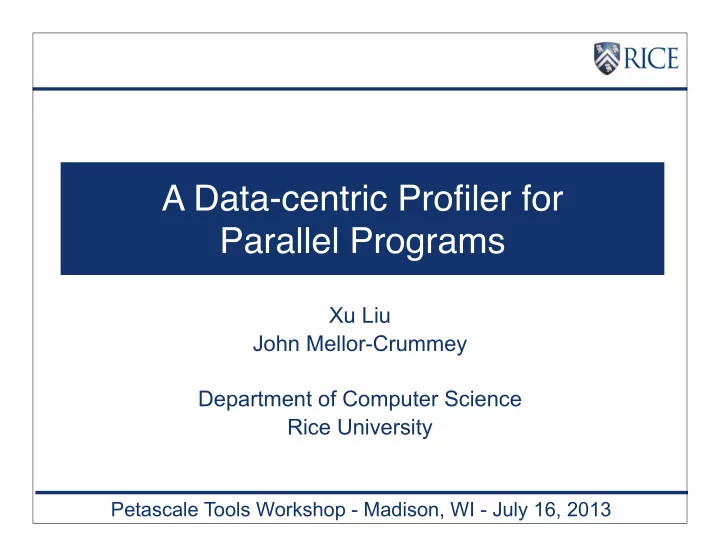

A Data-centric Profiler for Parallel Programs Xu Liu John Mellor-Crummey Department of Computer Science Rice University Petascale Tools Workshop - Madison, WI - July 16, 2013
Motivation Good data locality is important • – high performance – low energy consumption Types of data locality • – temporal/spatial locality • reuse distance • data layout – NUMA locality • remote v.s. local remote accesses: high latency, low bandwidth • memory bandwidth Performance tools are needed to identify data locality problems • – code-centric analysis – data-centric analysis 2
Code-centric v.s. data-centric Code-centric attribution • – problematic code sections • instruction, loop, function Data-centric attribution • – problematic variable accesses – aggregate metrics of different memory accesses to the same variable Code-centric + data-centric • – data layout match access pattern – data layout match computation distribution Combination of code-centric and data-centric attributions provides insights 3
Previous work Simulation methods • – Memspy, SLO, ThreadSpotter ... – disadvantages • Memspy and SLO have large overhead • difficult to simulate complex memory hierarchies Measurement methods • – temporal/spatial locality Support both static and • HPCToolkit, Cache Scope heap-allocated variable – NUMA locality attributions • Memphis, MemProf Identify both locality Work for both MPI and problems threaded programs GUI for intuitive analysis Widely applicable 4
Approach A scalable sampling-based call path profiler which • – performs both code-centric and data-centric attribution – identifies locality and NUMA bottlenecks – monitors MPI+threads programs running on clusters – works on almost all modern architectures – incurs low runtime and space overhead – has a friendly graphic user interface for intuitive analysis 5
Prerequisite: sampling support Sampling features that HPCToolkit needs • – necessary features • sample memory-related events (memory accesses, NUMA events) • capture effective addresses • record precise IP of sampled instructions or events – optional features • record useful metrics: data access latency (in CPU cycle) • sample instructions/events not related to memory Support in modern processors • – hardware support • AMD Opteron 10h and above: instruction-based sampling (IBS) • IBM POWER 5 and above: marked event sampling (MRK) • Intel Itanium 2: data event address register sampling (DEAR) • Intel Pentium 4 and above: precise event based sampling (PEBS) • Intel Nehalem and above: PEBS with load latency (PEBS-LL) – software support: instrumentation-based sampling (Soft-IBS) 6
HPCToolkit workflow Profiler: collect and attribute samples • Analyzer: merge profiles and map to source code • GUI: display metrics in both code-centric and data-centric views • 7
HPCToolkit profiler Record data allocation • – heap-allocated variables • overload memory allocation functions: malloc, calloc, realloc, ... • determine the allocation call stack • record the pair (allocated memory range, call stack) into a map – static variables • read symbol tables of the executable and dynamic libraries in use • identify the name and memory range for each static variable • record the pair (memory range, name) in a map Record samples • – determine the calling context of the sample – update the precise IP – attribute to data (allocation call path or static variable name) according to effective address touched by instruction 8
HPCToolkit profiler (cont.) Data-centric attribution for each sample • – create three CCTs – look up the effective address in the map • heap-allocated variables – use the allocation call path as a prefix for the current context – insert in first CCT • static variables – copy the name (as a CCT node) as the prefix – insert in second CCT • unknown variables – insert in third CCT Record per-thread profiles • 9
HPCToolkit analyzer Merge profiles across threads • – begin at the root of each CCT – merge variables next • variables have the same name or allocation call path – merge sample call paths finally 10
GUI: intuitive display allocation call path call site of allocation 11
Assess bottleneck impact Determine memory bound v.s. CPU bound • – metric: latency/instruction (>0.1 cycle/instruction → memory bound) Sphot: 0.097 average latency per memory access S3D: 0.02 percentage of memory instructions Identify problematic variables and memory accesses • – metric: latency for a variable or a program region: 12
Experiments AMG2006 • – MPI+OpenMP: 4 MPI × 128 threads – sampling method: MRK on IBM POWER 7 LULESH • – OpenMP: 48 threads – sampling method: IBS on AMD Magny-Cours Sweep3D • – MPI: 48 MPI processes – sampling method: IBS on AMD Magny-Cours Streamcluster and NW • – OpenMP: 128 threads – sampling method: MRK on IBM POWER 7 13
Optimization results Benchmark Optimization Improvement AMG2006 match data with computation 24% for solver change data layout to match Sweep3D 15% access patterns 1. interleave data allocation LULESH 13% 2. change data layout Streamcluster interleave data allocation 28% NW interleave data allocation 53% 14
Overhead Execution cution time Benchmark Benchmark Native With profiling AMG2006 551s 604s (+9.6%) Sweep3D 88s 90s (+2.3%) LULESH 17s 19s (+12%) Streamcluster 25s 27s (+8.0%) NW 77s 80s (+3.9%) 15
Conclusion HPCToolkit capabilities • – identify data locality bottlenecks – assess the impact of data locality bottlenecks – provide guidance for optimization HPCToolkit features • – code-centric and data-centric analysis – widely applicable on modern architectures – work for MPI+thread programs – intuitive GUI for analyzing data locality bottlenecks – low overhead and high accuracy HPCToolkit utilities • – identify CPU bound and memory bound programs – provide feedback to guide data locality optimization 16
Recommend
More recommend